|
|
|
Sort Order |
|
|
|
Items / Page
|
|
|
|
|
|
|
| Srl | Item |
| 1 |
ID:
051482
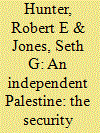

|
|
|
| 2 |
ID:
072028
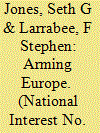

|
|
|
| 3 |
ID:
068451
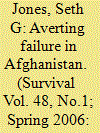

|
|
|
| 4 |
ID:
095966
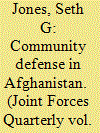

|
|
|
|
|
| Publication |
2010.
|
| Summary/Abstract |
Since the December 2001 Bonn
Agreement, which established an
interim Afghan government, the
United States and international
community have focused on building Afghan
National Army (ANA) and Afghan National
Police (ANP) forces as the linchpin to security.
While necessary, national security forces have
never been sufficient to establish security in
Afghanistan. This strategy reflects a Western
understanding of the "state," more appropriate
for U.S. efforts in Germany and Japan after
World War II.
|
|
|
|
|
|
|
|
|
|
|
|
|
|
|
|
| 5 |
ID:
153357
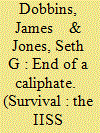

|
|
|
|
|
| Summary/Abstract |
From its peak in late 2014, the so-called Islamic State (also known as ISIS or ISIL) has steadily lost territory and population. As an actual – if unrecognised – state, it is on the verge of extinction. Mosul, its last major stronghold in Iraq, is nearly cleared. Raqqa, its capital in Syria, is surrounded and awaiting an assault. The trend lines are stark. By early 2017, according to our estimates, ISIS controlled approximately 45,377 square kilometres and roughly 2.5 million people in Syria and Iraq. Compared to autumn 2014, these numbers represented a 56% decline in Syria and an 83% decline in Iraq in terms of the Islamic State’s control of people. In Egypt, Libya, Afghanistan and Nigeria, ISIS controlled a combined 7,323km2 and 497,420 people by early 2017, representing a 75% drop in its control of people in Nigeria, nearly 100% in Libya and 87% in Afghanistan. In Egypt, ISIS operates in only a tiny stretch of the Sinai.1 Polling data also indicates declining support across the Muslim world for ISIS and its ideology.
|
|
|
|
|
|
|
|
|
|
|
|
|
|
|
|
| 6 |
ID:
052083
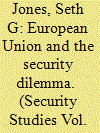

|
|
|
| 7 |
ID:
076943
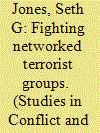

|
|
|
|
|
| Publication |
2007.
|
| Summary/Abstract |
In Iraq and Afghanistan, the United States faced "networked" adversaries: insurgent groups that communicated and coordinated their political and military campaigns without a central command. The rise of networked groups is a direct result of the preponderance of U.S. military power. Consequently, this article asks: What strategies have been most effective in defeating networked groups? To answer this question, the article examines Israeli operations against Palestinian groups during Operation Defense Shield in 2002. It argues that the most effective strategy to defeat networked adversaries is to use networked strategies. In Israel, this meant establishing multiple units to penetrate Palestinian urban areas, swarm together from several directions, and kill or capture militants.
|
|
|
|
|
|
|
|
|
|
|
|
|
|
|
|
| 8 |
ID:
120427
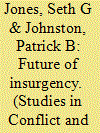

|
|
|
|
|
| Publication |
2013.
|
| Summary/Abstract |
What are key historical trends in insurgencies? And what do these finding suggest about the future of insurgency? We examine four aspects: causes of insurgency, outside support, strategies, and tactics. Based on an examination of quantitative and qualitative data, we make several arguments about the future. China could become increasingly involved in supporting insurgencies and counterinsurgencies if its economic and military power continues to increase and its global interest expands. In addition, insurgent groups will likely require less time to achieve high levels of sophistication for improvised explosive devices and other asymmetric tactics, which we expect they will use against more powerful mechanized counterinsurgent forces. We also expect that insurgent groups may take advantage of commercially-available technology to communicate, distribute propaganda, and recruit individuals. In addition, insurgents will likely make further use of encryption, anonymizing services, location-masking tools, and other related technologies to protect their online activities.
|
|
|
|
|
|
|
|
|
|
|
|
|
|
|
|
| 9 |
ID:
162068


|
|
|
| 10 |
ID:
095471
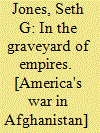

|
|
|
|
|
| Publication |
New York, W W Norton, 2009.
|
| Description |
xxxiv, 414p.
|
| Standard Number |
9780393068986, hbk
|
|
|
|
|
|
|
|
|
|
|
|
Copies: C:1/I:0,R:0,Q:0
Circulation
| Accession# | Call# | Current Location | Status | Policy | Location |
| 054888 | 958.1047/JON 054888 | Main | On Shelf | General | |
|
|
|
|
| 11 |
ID:
059137
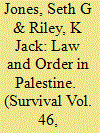

|
|
|
|
|
| Publication |
2004.
|
| Description |
p157-177
|
|
|
|
|
|
|
|
|
|
|
|
|
|
|
|
| 12 |
ID:
116107
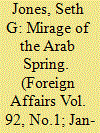

|
|
|
|
|
| Publication |
2013.
|
| Summary/Abstract |
As popular demonstrations swept across the Arab world in 2011, many U.S. policymakers and analysts were hopeful that the movements would usher in a new era for the region. That May, President Barack Obama described the uprisings as "a historic opportunity" for the United States "to pursue the world as it should be." Secretary of State Hillary Clinton echoed these comments, expressing confidence that the transformations would allow Washington to advance "security, stability, peace, and democracy" in the Middle East. Not to be outdone, the Republican Party's 2012 platform trumpeted "the historic nature of the events of the past two years -- the Arab Spring -- that have unleashed democratic movements leading to the overthrow of dictators who have been menaces to global security for decades." Some saw the changes as heralding a long-awaited end to the Middle East's immunity to previous waves of global democratization; others proclaimed that al Qaeda and other radicals had finally lost the war of ideas.
|
|
|
|
|
|
|
|
|
|
|
|
|
|
|
|
| 13 |
ID:
077358
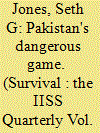

|
|
|
| 14 |
ID:
072468
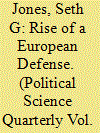

|
|
|
| 15 |
ID:
080961
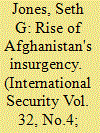

|
|
|
|
|
| Publication |
2008.
|
| Summary/Abstract |
In 2002 Afghanistan began to experience a violent insurgency as the Taliban and other groups conducted a sustained effort to overthrow the Afghan government. Why did an insurgency begin in Afghanistan? Answers to this question have important theoretical and policy implications. Conventional arguments, which focus on the role of grievance or greed, cannot explain the Afghan insurgency. Rather, a critical precondition was structural: the collapse of governance after the overthrow of the Taliban regime. The Afghan government was unable to provide basic services to the population; its security forces were too weak to establish law and order; and there were too few international forces to fill the gap. In addition, the primary motivation of insurgent leaders was ideological. Leaders of the Taliban, al-Qaida, and other insurgent groups wanted to overthrow the Afghan government and replace it with one grounded in an extremist interpretation of Sunni Islam
|
|
|
|
|
|
|
|
|
|
|
|
|
|
|
|
| 16 |
ID:
122006
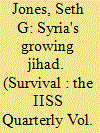

|
|
|
|
|
| Publication |
2013.
|
| Summary/Abstract |
The escalating war in Syria presents a growing threat to the Middle East and the West more broadly. Led by groups like Jabhat al-Nusra (the Victory Front), an al-Qaeda-affiliated organisation, Syria is becoming a training ground for foreign fighters and a microcosm of sectarian conflict. Over the past year, an increasing number of fighters have travelled to Syria from other areas - including the West - in an effort to topple the Assad regime, where some have joined Jabhat al-Nusra and other rebel groups. These fighters are gaining valuable experience in combat, bomb-making, propaganda and counter-intelligence. Most are developing relationships with fighters from other regions - such as the Persian Gulf, North Africa and South Asia - and becoming more ideologically committed. In addition, these ties are being used to transport greater amounts of money, lethal aid and non-lethal material to the Syrian front.
|
|
|
|
|
|
|
|
|
|
|
|
|
|
|
|
| 17 |
ID:
107152
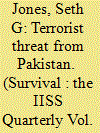

|
|
|
|
|
| Publication |
2011.
|
| Summary/Abstract |
With the death of Osama bin Laden and the emergence of the Arab Awakening, it has become de rigueur to argue that the primary terrorist threat to the West now comes from the Arabian Peninsula or North Africa. 'For the first time since the Sept. 11, 2001, attacks', extolled a Washington Post article after interviews with senior US government officials, 'CIA analysts see one of al-Qaeda's offshoots [in Yemen] - rather than the core group now based in Pakistan - as the most urgent threat to US security.' Some have even argued that al-Qaeda itself is increasingly irrelevant. 'Basically, we are winning dramatically', remarked Marc Sageman, a terrorism specialist and former CIA officer. 'You have an organization which is a shadow of its former self. We have got to the point where the real danger is from lone wolves who decide by themselves to turn violent.' US President Barack Obama joined in the chorus, triumphantly stating that 'we have put al-Qaeda on a path to defeat' because of the death of bin Laden and other senior operatives. In short, there appears to be a wave of triumphalism across the West that al-Qaeda and its allies are on the wane, and that the terrorist threat to the West has shifted away from Pakistan.
|
|
|
|
|
|
|
|
|
|
|
|
|
|
|
|
| 18 |
ID:
115869
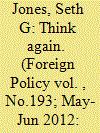

|
|
|
| 19 |
ID:
149289
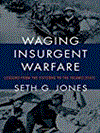

|
|
|
|
|
| Publication |
New York, Oxford University Press, 2017.
|
| Description |
ix, 336p.: figures, tableshbk
|
| Standard Number |
9780190600860
|
|
|
|
|
|
|
|
|
|
|
|
Copies: C:1/I:0,R:0,Q:0
Circulation
| Accession# | Call# | Current Location | Status | Policy | Location |
| 058903 | 355.02/JON 058903 | Main | On Shelf | General | |
|
|
|
|
| 20 |
ID:
163941
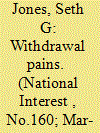

|
|
|
|
|
| Summary/Abstract |
Trump’s decision to withdraw U.S. forces from Afghanistan will almost certainly undermine any possibility of a peace settlement.
|
|
|
|
|
|
|
|
|
|
|
|
|
|
|
|
|
|
|
|
|